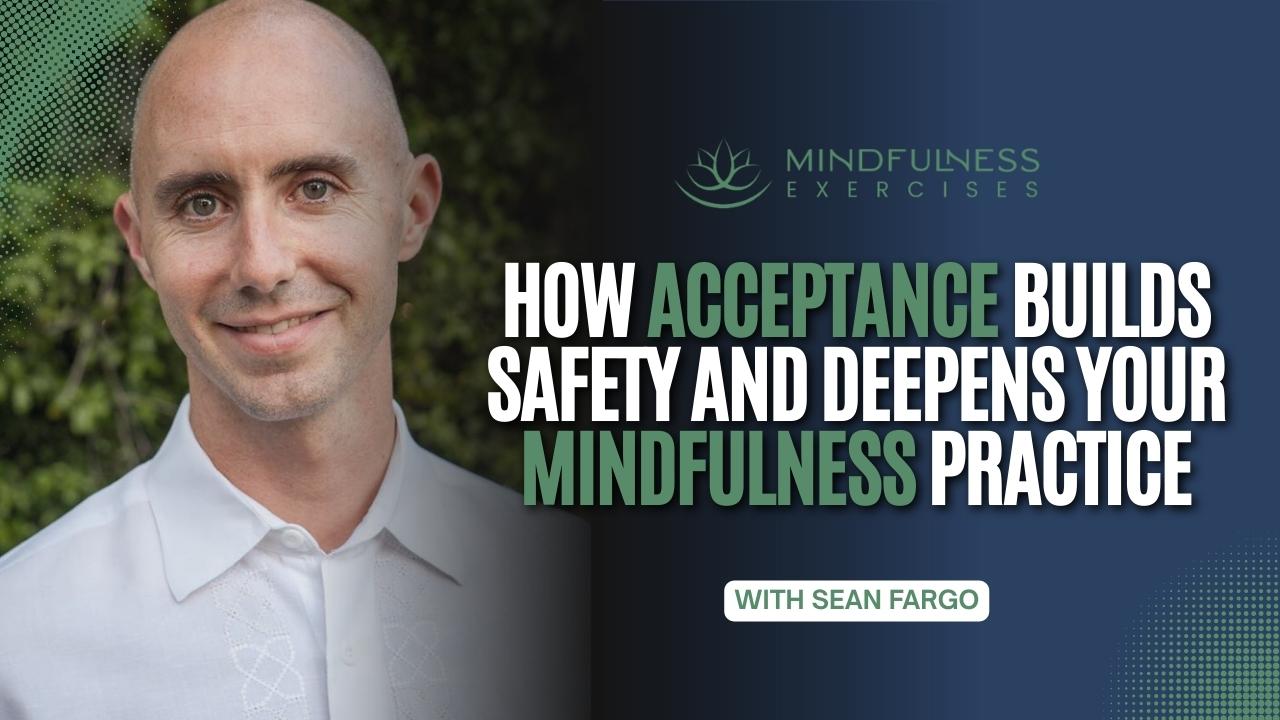Listen now
In today’s rapidly shifting, hyper-digital world, many of us feel split between our minds and bodies—overwhelmed, overstimulated, and under-resourced. In this compelling episode of the Mindfulness Exercises Podcast, Sean Fargo sits down with Mark Walsh, founder of Embodiment Unlimited, to explore one of the most direct antidotes to disconnection: embodied mindfulness.
Mark, known for his disarming humor, real-world bluntness, and trauma-informed grounding, has spent over 15 years teaching embodied practices in more than 50 countries, including conflict zones. Together, Sean and Mark dive deeply into what it means to live in the body, not just think about it—and why this matters for mindfulness teachers, coaches, therapists, and anyone longing to feel more whole.
Sponsored by our Mindfulness Meditation Teacher Certification Program
certify.mindfulnessexercises.com
Episode Overview
This conversation invites us into a more alive, humorous, trauma-sensitive approach to mindfulness—one that blends the body, heart, and mind. Mark shares his journey from addiction and martial arts to becoming a global leader in embodiment training. Sean offers grounding reflections on mindfulness as relational, courageous, and deeply human.
Together they explore:
- Why disembodiment is a silent mental health crisis
- How embodied awareness supports trauma healing
- Everyday movement and posture practices to reconnect
- Humor as medicine in mindfulness education
- Healthy boundaries, resilience, and people-pleasing
- The politics of mindfulness without the polarization
- How to build a sustainable, integrity-driven coaching business
- The role of AI and tech in our embodied future
This episode is equal parts practical, heartfelt, provocative, and refreshingly real.
Highlights:
| Timestamp | Section Title | Summary |
|---|---|---|
| 00:00 | Introduction | Sean introduces Mark Walsh as a leading figure in embodied coaching and mindfulness, highlighting his blend of psychology, somatics, humor, and trauma-informed awareness. |
| 02:37 | Mark’s Story: From Addiction to Embodiment | Mark shares his early struggles with addiction, emotional disconnection, and overthinking—and how martial arts, meditation, and embodiment practices restored presence and grounding. |
| 06:25 | The Mental Health Cost of Disembodiment | A discussion of how modern life pulls us out of our bodies and how this disconnection contributes to anxiety, numbness, overwhelm, burnout, and emotional instability. |
| 07:01 | What Presence Really Means | Presence isn’t just cognitive noticing—it’s an integrated felt experience of body, mind, awareness, and environment working together. |
| 09:51 | Simple Practices to Reconnect with the Body | Mark introduces posture awareness, somatic check-ins, micro-movements, and his 26-Pose Embodied Toolkit as simple, accessible ways to return to the body. |
| 15:16 | Meeting Fear and Discomfort with Compassion | Exploring trauma-informed embodiment approaches that neither react harshly nor collapse into fragility, but meet fear with gentleness and skillful awareness. |
| 21:14 | The Politics of Mindfulness | Sean and Mark unpack the tensions around politicized mindfulness, emphasizing nuance, curiosity, and compassion over polarization or rigid certainty. |
| 23:20 | Practical Ways to Explore Posture and Awareness | Mark describes using body shape, stance, breath, and movement to shift mood, strengthen boundaries, and influence interpersonal dynamics. |
| 28:48 | Embodiment in Coaching & Leadership | They close with insights on embodied leadership, authentic teaching, online coaching, and building a meaningful business in the age of AI, automation, and growing disconnection. |
Key Themes & Takeaways
1. Disconnection Is a Cultural Epidemic
Modern life rewards speed, screens, and thinking—but not feeling. Embodied mindfulness reconnects us to signals we’ve ignored: tension, collapse, breath, instinct, intuition, and natural boundaries.
2. Embodied Awareness Supports Trauma Healing
Trauma lives in the body—not the mind alone. Trauma-sensitive embodiment includes titration, pacing, safety, grounding, and nonverbal awareness.
3. The Body Never Lies
Posture, gestures, facial expressions, and movement patterns reveal our habits of stress, fear, dominance, collapse, or confidence.
4. Humor Is a Pathway to Presence
Mark’s playful irreverence breaks the tension around “being spiritual” and brings freshness, warmth, and humility into mindfulness work.
5. Embodied Coaching Is the Future of Mindfulness Teaching
With AI replacing cognitive tasks and digital life accelerating, embodied presence becomes one of the most valuable human skills.
Simple Embodiment Practices from the Episode
Try these anytime during the day:
✔ The 10-Second Somatic Check-In
Pause. Feel your feet, your breath, your jaw, your hands.
✔ Shape-Shift Your Posture
Move from collapsed to upright—or from rigid to relaxed—and notice what shifts in mood and thought.
✔ Micro-Movements
Roll your shoulders, stretch your spine, soften your belly.
✔ Name One Sensation
Warmth… buzzing… heaviness… tingling… pressure… Pick one.
✔ Embodied Boundaries
Stand tall, feet planted, breathe evenly. Feel the space around you.
These practices retrain the nervous system toward safety, confidence, and presence.
About Mark Walsh
Mark Walsh is the founder of Embodiment Unlimited and one of the world’s most widely recognized embodiment teachers. He has trained over 50,000 students internationally and taught in humanitarian and conflict settings, integrating somatics, psychology, ethics, and trauma sensitivity.
Mark hosts The Embodiment Podcast, runs the Embodiment Coaching Certification, and is the creator of the 26-Pose Embodied Toolkit, a practical method for coaches and mindfulness teachers to support awareness, boundaries, and emotional resilience.
Learn more about Mark:
- Embodiment Unlimited
- Instagram – @warkmalsh



